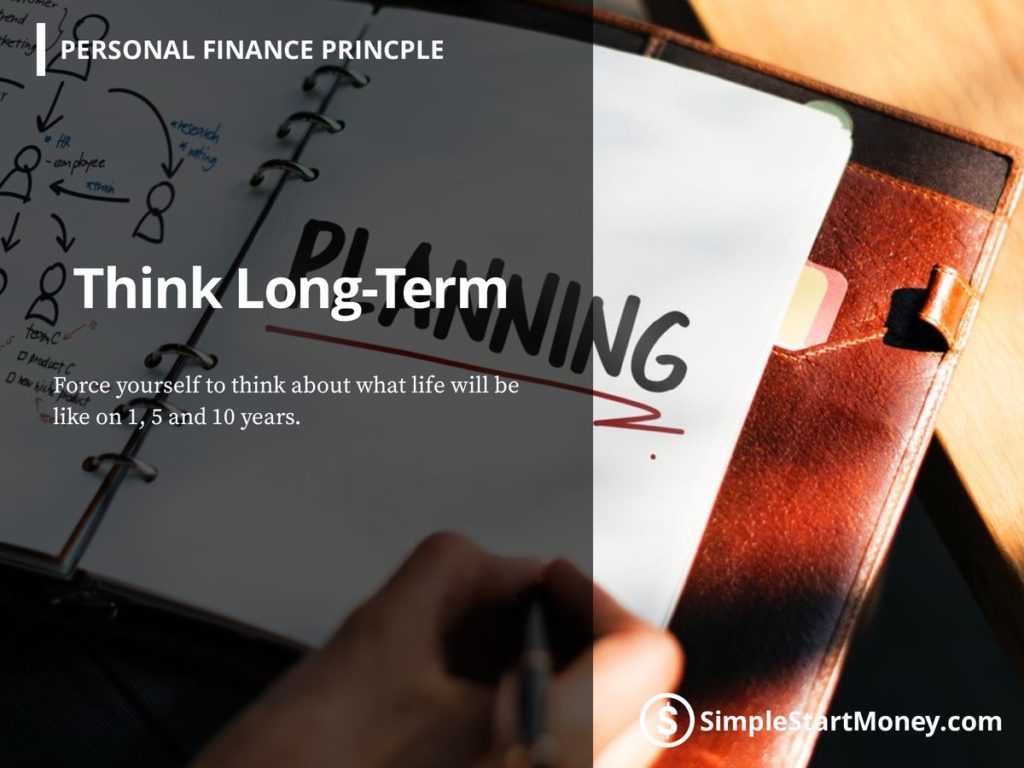
Learn these personal finance principles to stop living paycheck to paycheck, get ahead in life and start down the path of financial success.
Spend Less than you Earn and Get Ahead

It sounds so simple yet so many people live paycheck to paycheck or are drowning in debt. Let’s break it down.
- If you spend more than you earn you accumulate debt.
- If you spend the exact amount your earn you are living paycheck to paycheck.
- If you spend less than you earn you are getting ahead.
View Money as a Tool

Don’t give money more power than it deserves. Money is made the enemy when we don’t have enough of it and the solution when we think in terms of our problems disappearing if we just had more money. We tend to attach emotion and feeling to money. We may even assign judgment to others based on how much of it we think they have. If allowed, money will consume us with worry and fear about not having enough, or worse, fill us with greed and leave us always wanting and chasing more.
Evolve your thinking from simply wanting more money to seeing and using money as a tool to achieve your goals.
Set Financial Goals, Write Them Down, Review Them Often

Start small. Make a list of things you want to accomplish, purchases you want to make and experiences you want to have. Write down how much these will cost and by when you want to achieve them. Start prioritizing your spending to align with this list. You now have financial goals and a strategy for achieving them. Follow this process quarterly for best results.
Adopt a Net Worth Mindset

Income and wealth are separate and distinct measures. If you earn a million dollars a year and spend it all, you add nothing to your wealth. Consider the following advice inspired by the investment philosophy of John C. Bogle, founder of Vanguard Investments.
“From the time we are old enough to understand, society conditions us to confuse income with wealth. We believe that doctors, CEOs, professional athletes, and movie actors are rich because they earn high incomes. We judge the economic success of our friends, relatives, and colleagues at work by how much money they earn. Six-and seven-figure salaries are regarded as status symbols of wealth. Although there is a definite relationship between income and wealth, they are very separate and distinct economic measures. Income is how much money you earn in a given period of time. If you earn a million in a year and spend it all, you add nothing to your wealth. You’re just living lavishly. Those who focus only on net income as a measure of economic success are ignoring the most important measuring stick of financial independence. It’s not how much you make, it’s how much you keep.”
Think Long-Term

We cannot realize our potential as people or in our finances unless we plan for the long-term. In his 1997 shareholder letter, Jeff Bezos, CEO of Amazon, issued a manifesto called “it’s all about the long-term” in which he pledged to plan and make decisions with a long-term lens. This mentality has helped Amazon grow from 11 employees to over 600,000 and become one of the most profitable companies of all time.
Force yourself to think about what life will be like on 1, 5 and 10 years. What do you want to be doing in 5 years? How much money do you want to have in 10 years? What major purchases will you need to make in 1, 5 and 10 years? Write your answers down and work them into your financial goals.
Avoid the Herd Mentality

Herd mentality is when people abandon reason and follow the crowd. A herd mentality causes us to alter our perception of reality to align with the mass opinion of our peers. Always beware of following the masses because sometimes the “M” is silent. Always question advice and seek independent and contrary opinions when making major financial decisions—no matter how painful or time consuming.
Plan for the Worst

Plan for the worst by having an emergency fund. Unexpected events such as job loss, medical emergency, or unexpected home or vehicle repairs can be stressful and costly. Start stashing a little money away each month to cover unexpected expenses. Your future self will thank you.
Diversify

Diversify your investments to boost returns and limit losses in a downturn. Diversification is a strategy to decrease the risk of loses by spreading money across investments which have historically moved in opposite directions. Historically stocks, bonds, cash and others have moved in opposite directions. A sound diversification strategy will ensure your portfolio continues to grow even when a portion is declining.
Don’t Pay Credit Card Interest

Always do the math before financing a purchase with a credit card. The average credit card interest rate right now is around 19%. If you finance a $2000 television with a credit card and make only the minimum payment (usually around 3%) it will take you 12.1 years to pay off the purchase and will cost you an additional $1,892 in interest. Source: ConsumerCredit.com.
Everything is Negotiable

Be a Price Setter—not a Price Taker. Everything is negotiable. Start a habit of asking for a discount or different terms when purchasing any type of product or service. Insurance, credit card rates, vehicles, selling terms and salary, it is all negotiable. Force yourself to get over the awkwardness of asking for something different than what is offered. You don’t need to be a jerk about it. Be confident and assertive and remember the answer is always no unless you ask.

